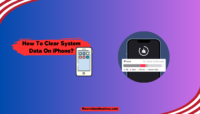Can iPhones get viruses? This is the first question in mind when people notice that their iPhones are behaving weirdly lately If you are having the same problem, I will solve it today with a detailed analysis.
In this post, I will share whether it is possible to get a virus on your iPhone and share my thoughts that’ll help you protect your data and privacy so that it doesn’t fall into the wrong hands. Without wasting any time, let’s get started.
Can iPhones Get Viruses?
The straightforward answer to this question is NO. Getting a virus on an iPhone is a rare instance because Apple has delivered all of its products with high-security measures, and compared to Android devices, it is highly secured.
You’ll find a lot of debate on the internet that iPhones are pretty secure compared to any Android device, and it is practically true. The reason behind this is pretty simple. Apple takes extra measures regarding the privacy and security of its product and its users. They don’t want to compromise because failing in this department may ruin their reputation as a premium brand.
Let me show the 3 major differences between these two platforms without boring you:
- Updates: iOS release major updates to their devices regularly to patch any existing bug that may comprise your data and privacy; however, Android lags in this department because a single company doesn’t control it, and different brands release updates on their products on different timelines, and chances of getting a virus on their Android phones gets pretty high.
- Third-Party Applications: As of now, Apple doesn’t allow third-party applications to install on their iOS devices which means you can install apps only from the App Store, whereas you can install any third-party applications on Android devices and isn’t monitored by Android whether it is infected with a virus or not.
- Operating System Compatibility: iOS is run by a single company i.e. Apple, whereas Android runs on phones of multiple brands such as Samsung, OnePlus, Sony, etc, which becomes a little easier for hackers to inject viruses on Android devices via browsers or apps.
Note: You can install third-party apps on your iOS devices. However, it must be jailbroken, which will void your warranty, and I would highly recommend not doing that.
I hope you may have understood why it is difficult to get a virus on iPhone compared to Android, the most widely used operating system in the world. I guess you may have got my point by now.
Is It Impossible To Get A Virus On iPhone?
No, it is possible to get a virus on your iPhone. However, the chances are very slim If you are wondering how to confirm whether you have a virus on your iPhone, continue reading.
How To Check iPhone For Viruses?
Here’s how you can check If your iPhone has any viruses.
1. Overheating:

One of the first things you should check on your iPhone If it has any virus is, the heating condition. Yes, If your iPhone is overheating, and you may suspect it has a virus because some apps might consume more power than ever before.
2. Consumes More Data:

If your iPhone is consuming a lot of mobile data than usual, you may suspect it has got some virus. In this situation, you need to check If you are using any high data-consuming apps like YouTube, Netflix, Prime Video etc If you are not, chances are it has got a virus.
3. Check The Apps On Your Phone:

If you notice that some apps have been installed on your iPhone without your knowledge, it might be related to the virus on your device. You should immediately uninstall those apps which you have not installed by yourself.
4. Apps Crashing Regularly:

If any app on your iPhone is crashing regularly, which was not the case before, you may confirm that some virus has got infected on your device. Restart your device again and see if the same thing is happening. It may have got a virus if it is doing the same thing.
5. Battery Draining Quickly:

Another sign of having a virus on an iPhone is, the battery on your device is draining quickly, and you have to charge your phone multiple days for a day. Charge your phone again and see if you see the same pattern again.
Okay, these are some of the major signs of having a virus on your iPhone; let’s move and see how you can prevent yourself from getting any kind of virus on your iPhone.
How To Get Rid Of A Virus On iPhones (And Prevent Them)?
Follow these steps carefully to protect your iPhone from getting a virus.
1. Update The Firmware On Your Device:
To update the firmware on your iPhone, you have to:

- Launch the “Settings” app on your device.
- Now, go to “General” and tap “Software Update”.
- If the update is available, click “Download” and complete the process.
One of the first things you should do to protect your iPhone from getting a virus is to update the firmware/ software of the device. As I mentioned, Apple releases the latest firmware for their devices so that their users are safe from hackers and brings new and exciting features.
It is already updated if you don’t get the download option while updating.
2. Visit Only Trusted Websites:
Another important thing you should keep in mind to protect your iPhone from getting a virus is to visit only trusted websites. You should never click on websites that you think are suspicious because they may inject a virus into the device. One of the major signs of a trusted website is it’ll use “https” on its website link instead of just “http”.
3. Turn Off Bluetooth When Not In Use:
Another way to inject a virus into your iPhone is via Bluetooth. Whenever you want to use Bluetooth to transfer data or connect your headphone, turn it on only then. If you aren’t using it, you should turn off the Bluetooth to avoid hackers.

4. Don’t Jailbreak Your iPhone:
Even though jailbreaking your iPhone seems exciting because it lets you do unconventional things such as uninstalling system apps, installing third-party apps etc, however, you should also know the other side.
There are many downsides of jailbreaking your iPhone, and one of the things among them is, you’ll no longer receive automatic updates to your device. Hackers may inject a virus by exploiting a bug when you don’t get automatic updates on your iPhone. That’s why Apple doesn’t support jailbreak, and I highly recommend not doing that.
5. Use A VPN When Using Public Wi-Fi:
When you are in a public place like a railway station, you may get free Wi-Fi. However, you need to be cautious while using that because they may steal your data and sell it to someone who can hack or inject a virus into your device.
In this kind of situation, you need to use a good VPN like ExpressVPN, by which you can easily spoof your location. I’ve also written a detailed guide on spoofing your location on your iPhone on this site. Do check it out If you are interested to know about that.
Frequently Asked Questions:
If your iPhone behaves strangely, like crashing the apps regularly, draining the battery faster than usual, overheating, etc, your iPhone may have got a virus.
If you can spot any of these things on your iPhone, chances are your device may already have got the virus, and you need to get rid of it as soon as possible.
Your iPhone may get a virus by visiting suspicious websites.
Not only on iPhone, anyone will get a virus on their mobile device by visiting unauthorized or suspicious websites, and that’s why you must be a little cautious when visiting a site for the first time.
No, iPhone doesn’t need an antivirus app in most cases.
iPhones are pretty secure compared to other platforms like Android because Apple has designed their software so that it is a little difficult for hackers to get inside the device, and that’s the main reason iPhones don’t need an antivirus app.
There is no need to worry when you click on a suspicious link on your iPhone because only by clicking a hacker or a scammer doesn’t get anything from you. You must install an app or enter your secret password to get something from you.
Conclusion:
People who have recently switched from Android to iPhone get the question, “Can iPhones get viruses” because they may have been a victim of a scam using that Android device; however, that’s not easily doable on iPhone devices because of the security system by Apple.
I hope you may have got the right answer with this post. If you have any other questions, let me know in the comments and I’ll talk to you soon. Thanks.
Since 2014 I have been writing about tech and helping others to fix tech issues related to Android, Windows, iOS, Chromebook, and more.
I love to help others to fix any technical issues they might be facing.






